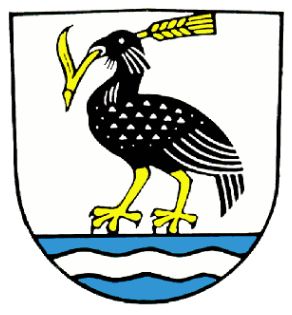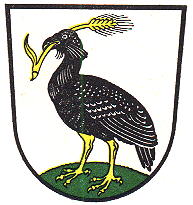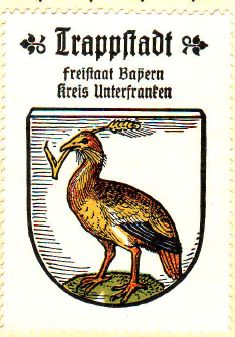Trappstadt: Difference between revisions
Knorrepoes (talk | contribs) No edit summary |
Knorrepoes (talk | contribs) No edit summary |
||
| Line 19: | Line 19: | ||
The arms were officially granted on January 24, 1986. | The arms were officially granted on January 24, 1986. | ||
The arms show a canting bird (Trapp= | The arms show a canting bird (Trapp=bustard). The village became a town (Markt) in 1778, but the oldest seal dates from around 1656. The seal shows, as do all later seals, already the bird as the symbol of the town. | ||
In a later image the bird is placed on three small hills, which should represent the Höhberg, Spanshügel and Altenburg hills in the town. The arms were first officially granted in 1836, but there have been many interpretations of the arms during the years. The picture below shows the arms as granted in 1836. | In a later image the bird is placed on three small hills, which should represent the Höhberg, Spanshügel and Altenburg hills in the town. The arms were first officially granted in 1836, but there have been many interpretations of the arms during the years. The picture below shows the arms as granted in 1836. | ||
Revision as of 07:35, 31 December 2013
| Heraldry of the World Civic heraldry of Germany - Deutsche Wappen (Gemeindewappen/Kreiswappen) |
TRAPPSTADT
State : Bayern
District (Kreis) : Rhön-Grabfeld (until 1973 Königshofen im Grabfeld)
Additions : 1978 Alsleben
Official blazon
Über blauem Schildfuß, darin ein silberner Wellenbalken, in Silber eine schwarze Trappe mit goldenen Füßen, die einen goldenen Getreidehalm im Schnabel hält.
Origin/meaning
The arms were officially granted on January 24, 1986.
The arms show a canting bird (Trapp=bustard). The village became a town (Markt) in 1778, but the oldest seal dates from around 1656. The seal shows, as do all later seals, already the bird as the symbol of the town.
In a later image the bird is placed on three small hills, which should represent the Höhberg, Spanshügel and Altenburg hills in the town. The arms were first officially granted in 1836, but there have been many interpretations of the arms during the years. The picture below shows the arms as granted in 1836.
| The arms from 1836 |
The arms in the Kaffee Hag albums +/- 1925 |
Literature : Stadler, 1964-1971, 8 volumes; Hupp, O: Kaffee Hag albums, 1920s



